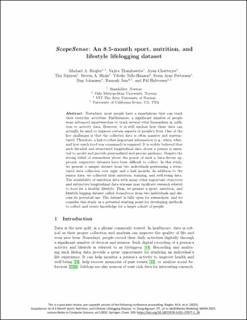ScopeSense: An 8.5-Month Sport, Nutrition, and Lifestyle Lifelogging Dataset
Riegler, Michael Alexander; Thambawita, Vajira; Nguyen, Thu; Hicks, Steven Alexander; Pettersen, Svein Arne; Telle-Hansen, Vibeke; Johansen, Dag; Jain, Ramesh; Halvorsen, Pål
Peer reviewed, Journal article
Accepted version
Permanent lenke
https://hdl.handle.net/11250/3125307Utgivelsesdato
2023Metadata
Vis full innførselSamlinger
Originalversjon
Lecture Notes in Computer Science (LNCS). 2023, 13833 502-514. https://doi.org/10.1007/978-3-031-27077-2_39Sammendrag
Nowadays, most people have a smartphone that can track their everyday activities. Furthermore, a significant number of people wear advanced smartwatches to track several vital biomarkers in addition to activity data. However, it is still unclear how these data can actually be used to improve certain aspects of people’s lives. One of the key challenges is that the collected data is often massive and unstructured. Therefore, a link to other important information (e.g., when, what, and how much food was consumed) is required. It is widely believed that such detailed and structured longitudinal data about a person is essential to model and provide personalized and precise guidance. Despite the strong belief of researchers about the power of such a data-driven approach, respective datasets have been difficult to collect. In this study, we present a unique dataset from two individuals performing a structured data collection over eight and a half months. In addition to the sensor data, we collected their nutrition, training, and well-being data. The availability of nutrition data with many other important objectives and subjective longitudinal data streams may facilitate research related to food for a healthy lifestyle. Thus, we present a sport, nutrition, and lifestyle logging dataset called ScopeSense from two individuals and discuss its potential use. The dataset is fully open for researchers, and we consider this study as a potential starting point for developing methods to collect and create knowledge for a larger cohort of people.
